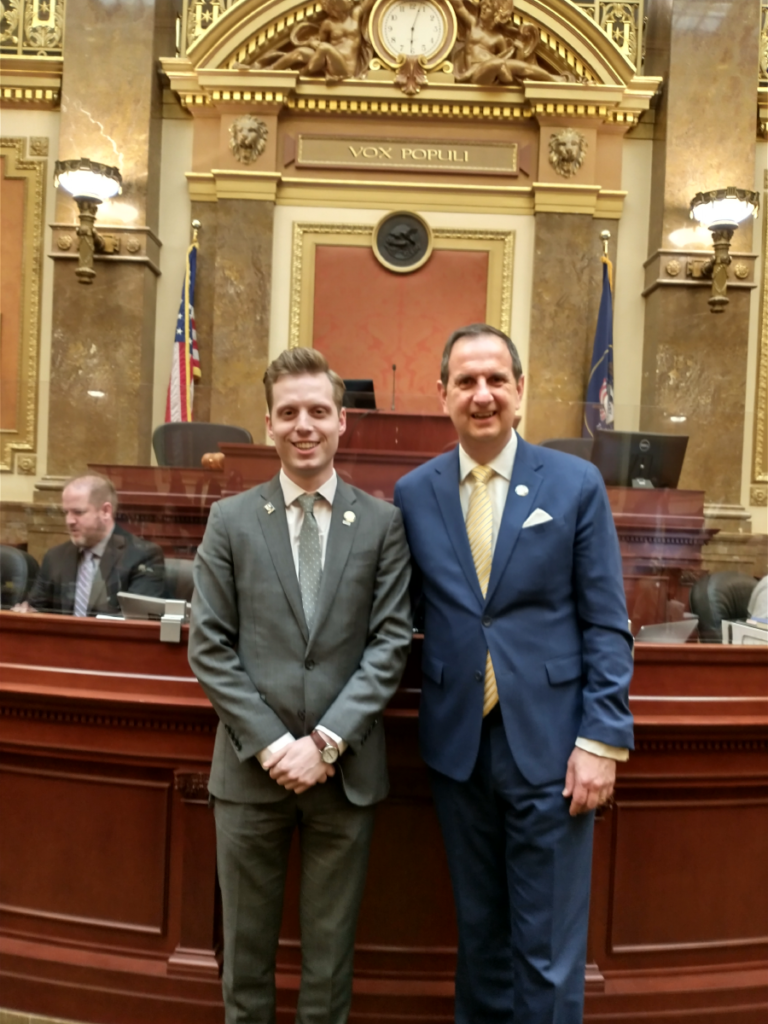We made it to the end of the 2022 General Session, and I am proud of what we accomplished! The Legislature passed several bills that exemplify the Utah Way. I am particularly grateful for the insight and feedback from many of you that really helped keep a sharp focus on what is important.

I want to give a huge shoutout to my session intern, Aaron Maynes. I could not have made it through without his help.
Utah Stands with Ukraine
As we entered the final week of the session, we were reminded that our work is made possible because of the freedoms we enjoy. Freedoms that are under attack in Ukraine. On Tuesday, I joined state leaders and fellow Utahns to rally in a united show of support for the people of Ukraine. My heart is with them.

Big Picture
The last week of the session is somewhat chaotic as everyone is making one last push to get their bills all the way through the process. Of the 513 bills that passed this year, 290 received final approval during the last week. In some cases, corners get cut. Bills are supposed to have two favorable committee hearings, one in each chamber. This year, only 77 bills passed without meeting that requirement.
The House Majority team focused on the five policy pillars of Water, Affordable Utah, Education Modernization, Maintaining the Utah Way, and Generational Investment. Working together we addressed:
- Water: HB 242, Secondary Water Metering, to better help us conserve water in the ongoing and historic drought and provided significant funding for preservation of the Great Salt Lake and Utah Lake.
- Affordable Utah: A $200 million income tax cut, which begins to put money back in your pockets in these difficult times.
- Education Modernization: We increased per-pupil spending by 6% and increased the education budget by $383 million.
- Maintaining the Utah Way: We focused on maintaining the Utah way by consolidating state outdoor recreation efforts with HB 409.
- Generational Investments: In addition to generational investments in water, transportation, outdoor recreation and more, we made generational investments with HB 438 and HB 443 (Point of the Mountain and Utah Inland Port) that will power Utah’s economic engine for generations.
Learn more about our priorities
Watch this short video to learn how these bills impact YOU.
Job Done
Here is a summary of what I was able to accomplish this year:
- Secured funding to allow pharmacists to provide Medication Therapy Management to Medicaid recipient. This is show to pay for itself as pharmacists can help patients with complex prescriptions better manage their care, stay healthier and avoid high-cost medications.
- Passed: HB 176 – Utah Health Workforce Act creates a process for developing health care workforce in a way that breaks down silos, informs policymakers with relevant data, and makes a more efficient use of existing resources. This was done at no additional cost to the taxpayer.
- Passed: HB 217 – Telephone Solicitation Amendments to make it harder for Utah-based telemarketers to find loopholes around the Do Not Call provisions.
- Passed: HB 283 – Mental Health Professional Licensing Amendments to reduce the number of hours required to be a social worker, mental health counselor or marriage therapist to align with national averages.
- Passed unanimously: HB 328 – Driver License and License Plate Amendments (with Rep. Pitcher) which is a bipartisan effort to allow people with invisible disabilities to have their drivers license or license plate record annotated to help law enforcement know that everything might not be as it seems in case of emergency.
Unfinished business
As sometimes happens, HB 368, my proposal to simplify and bring transparency to Utah’s license plate program, got caught in the crossfire on the last night and time ran out before we could get to a Senate vote. I am not too worried because while this took a lot of time and it is disappointing that the Senate didn’t get the job done, it’s not going to have a major impact to be delayed for a year.
Another issue that I plan to work on over the interim is a deep dive and hopefully significant improvement in how we spend money intended to help people get out of poverty. Our current system is very disjointed and not very effective in actually getting families on a path to independence. It’s not a question of not spending enough, it’s a question of not focusing on the right issues. I hope to come back next year with a plan that will lift 2,500 families permanently out of poverty within three years. I think we can do this without additional resources simply by following the data and understanding the root causes of poverty.



